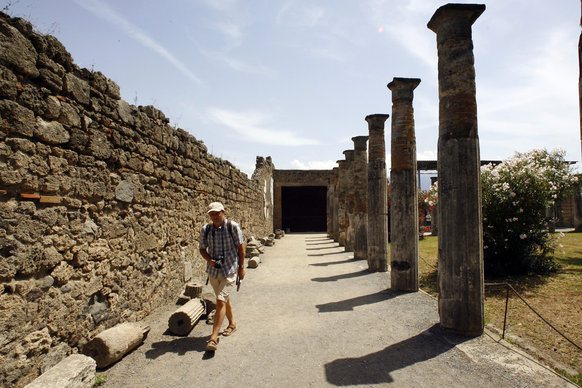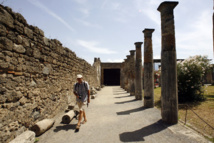Police have launched an investigation into the theft of the 20-centimetre (eight-inch) wide fragment, which was taken from an area closed to the public, leaving a glaring white slash in the pink-toned fresco where the god Apollo now stands forlornly alone.
The discovery sparked outrage in Italy, with newspaper Il Messaggero describing it as "a shame for the country", made doubly embarrassing by the recent appointment of a new superintendent for the site.
The European Union's Culture Commissioner Androulla Vassiliou said she was "truly saddened" by the theft, telling ANSA news agency that the robbers "have stolen a priceless patrimony which belongs to all citizens, Italian and European, and future generations".
Professor Umberto Pappalardo, archaeological expert at the Suor Orsola Benincasa University, told AFP he suspected petty criminals were behind the theft, rather than art thieves hoping to hawk the fragment on the international market.
"Selling a stolen fresco from a site as well documented as Pompeii would be a very, very tall order. There would certainly not be any market for it in Italy," he said.
The theft comes after a fragment of fresco taken from another part of the ancient site, the House of the Orchard, was sent to the curator's office in an anonymous package in January.
Pompeii's new superintendent, Massimo Osanna, told Italian media that "everything is being done" to recover the painting of Artemis and insisted that reinforcing security was one of his top priorities.
Curators said police would be looking at surveillance footage from the perimeter of the site in a bid to identify the crooks, but said there were no security cameras within the ruins.
- 'Pompeiian collapse' -
The discovery of the thefts comes on the back of a series of collapses in the long-neglected ruins near Naples, which have drawn international concern.
The Temple of Venus and walls of a tomb were damaged earlier this month after heavy rains, prompting the European Union to urge Italy to "take care of Pompeii, because it is emblematic not only for Europe but also for the world".
In response, Italy said it would unblock some two million euros ($2.8 million) to help oil the wheels of a major EU-backed project to restore the site.
Prime Minister Matteo Renzi also appealed to private investors to help restore the ruins.
"The disappearance of the fresco from the House of Neptune can be classified as another 'Pompeiian collapse', where however, instead of precious walls crumbling, it is Italy's precious reputation," said Antonio Irlando from the Observatory for Cultural Patrimony.
Last year, conservation workers began a 105-million-euro makeover of Pompeii, funded by the EU to the tune of almost 42 million euros.
But according to the Corriere della Sera daily, only 588,000 euros have been spent so far -- just 0.56 percent of the funds.
The project is seen as crucial to the survival of the 44-hectare site in the shadow of Mount Vesuvius, the volcano that destroyed the city of Pompeii in 79 AD.
------------------------------------------------------
The discovery sparked outrage in Italy, with newspaper Il Messaggero describing it as "a shame for the country", made doubly embarrassing by the recent appointment of a new superintendent for the site.
The European Union's Culture Commissioner Androulla Vassiliou said she was "truly saddened" by the theft, telling ANSA news agency that the robbers "have stolen a priceless patrimony which belongs to all citizens, Italian and European, and future generations".
Professor Umberto Pappalardo, archaeological expert at the Suor Orsola Benincasa University, told AFP he suspected petty criminals were behind the theft, rather than art thieves hoping to hawk the fragment on the international market.
"Selling a stolen fresco from a site as well documented as Pompeii would be a very, very tall order. There would certainly not be any market for it in Italy," he said.
The theft comes after a fragment of fresco taken from another part of the ancient site, the House of the Orchard, was sent to the curator's office in an anonymous package in January.
Pompeii's new superintendent, Massimo Osanna, told Italian media that "everything is being done" to recover the painting of Artemis and insisted that reinforcing security was one of his top priorities.
Curators said police would be looking at surveillance footage from the perimeter of the site in a bid to identify the crooks, but said there were no security cameras within the ruins.
- 'Pompeiian collapse' -
The discovery of the thefts comes on the back of a series of collapses in the long-neglected ruins near Naples, which have drawn international concern.
The Temple of Venus and walls of a tomb were damaged earlier this month after heavy rains, prompting the European Union to urge Italy to "take care of Pompeii, because it is emblematic not only for Europe but also for the world".
In response, Italy said it would unblock some two million euros ($2.8 million) to help oil the wheels of a major EU-backed project to restore the site.
Prime Minister Matteo Renzi also appealed to private investors to help restore the ruins.
"The disappearance of the fresco from the House of Neptune can be classified as another 'Pompeiian collapse', where however, instead of precious walls crumbling, it is Italy's precious reputation," said Antonio Irlando from the Observatory for Cultural Patrimony.
Last year, conservation workers began a 105-million-euro makeover of Pompeii, funded by the EU to the tune of almost 42 million euros.
But according to the Corriere della Sera daily, only 588,000 euros have been spent so far -- just 0.56 percent of the funds.
The project is seen as crucial to the survival of the 44-hectare site in the shadow of Mount Vesuvius, the volcano that destroyed the city of Pompeii in 79 AD.
------------------------------------------------------









 Home
Home Politics
Politics











